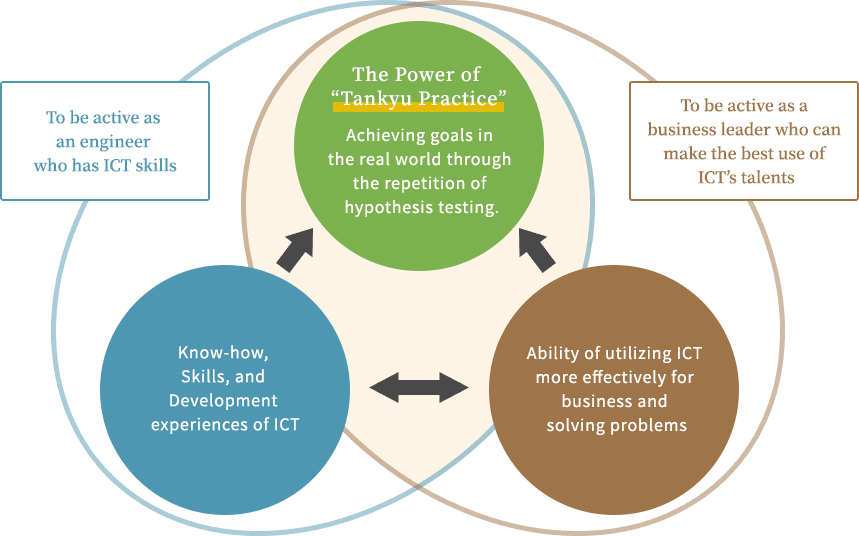Social innovation by ICT and Yuorself
“3 Skills” and “2 Images of Human Resources” in KIC

Master program which increases your value as human resources, and broadens your active field
KIC is an educational institution aiming to produce experts who have ICT skills as well as business skills.
At KIC, you will acquire expertise necessary to introduce services and solutions utilizing ICT for education, medical services, industry, agriculture, finance, and many other fields.
You will be able to support governments, companies, as well as individuals. We are living an era when not only company employees but also fresh graduates opt to enroll in professional graduates in order to sharpen and upgrade their skills to match the new business opportunities.
Many ambitious foreign students from different background including companies and national governments in world have joined our program.
It is advantageous environment to actively acquire business senses and communication skills required for the global market in the future.
- Technical
College - Business
College - International
College
You will learn and practice the 3 elements.
“Tankyu Practice” program
KIC's original "Tankyu Practice" program is based on the problem solving procedures from world-famous consulting firms.
- Find social problems by yourself,
- Improve and utilize your strength,
- Practice system development in real-world, try to solve problems with testing the hypothesis over and over.
You will acquire the expertise of adopting the methods and behavior patterns necessary for solving social prob-lems through practical training.
Our “Tankyu Practice” was first adopted to innovation programs at home and abroad; but in recent years, training programs at interna- tional agencies have also started utilizing it. There is an increase in its value as a method of finding a solution to a given problems.
“Tankyu” chart (A hypothesis of Problem solving/Value creation)
- The awareness of problem
- How dissatisfactions do you try to solve in the present situation?
- Providing additional values
- How do you change?
How values do you provide for people who benefit?
The necessary things for making values
- The sources of money
- The providers and reasons(nominal)
- The skills/know-how
- The skills and know-how for providers values
- The human resources
- The human resources for providing values
Flow chart of “Tankyu Practice”
Testing the hypothesis
by 3 points of view
Setting problems
Planning a hypothesis
-
- Testing the hypothesis1
-
- Does it make users to be pleased?
- Do the users who get services use it satisfactorily, and realize the value of it?
-
- Testing the hypothesis2
-
- Does it have originality?
- Does it have superiority of cost performance and something compared with the existing services or future services which will be expected to provide?
-
- Testing the hypothesis3
-
- Does it make the accounts to show a profit?
- Does it make even up accounts?
What’s the plan of accounts in each fiscal years?
What risks and solutions does it have?
Do
Curriculum
All curriculum are designed by teachers who have enough business experience
ICT field
Teachers who have long business, development, and management experiences in ICT and Electronics field prepare and deliver lectures starting from the foundation stage.
You will learn the principle of computer and application operation through OSS innovative teaching materials, and then try to solve problems through project for study activities.

- AI / IoT / Big Data / Smartphone App / Cloud Computing / Web Development
Covering from Social Development (ICT4D) to Venture Business
Business and Social Development field
We train the human resources to be able to decide what things are necessary for a specific solution of a social problems and for providing new services through utilizing ICT.
Experienced teachers who are well versed in variety of problems deliver lectures that include practical activities from case studies, excises, projects, and prototype development.

- ICT for Agriculture / ICT for Disaster Prevention / Prevention Development / Social Development / Business Analysis / Requirements Analysis / Business Modeling

